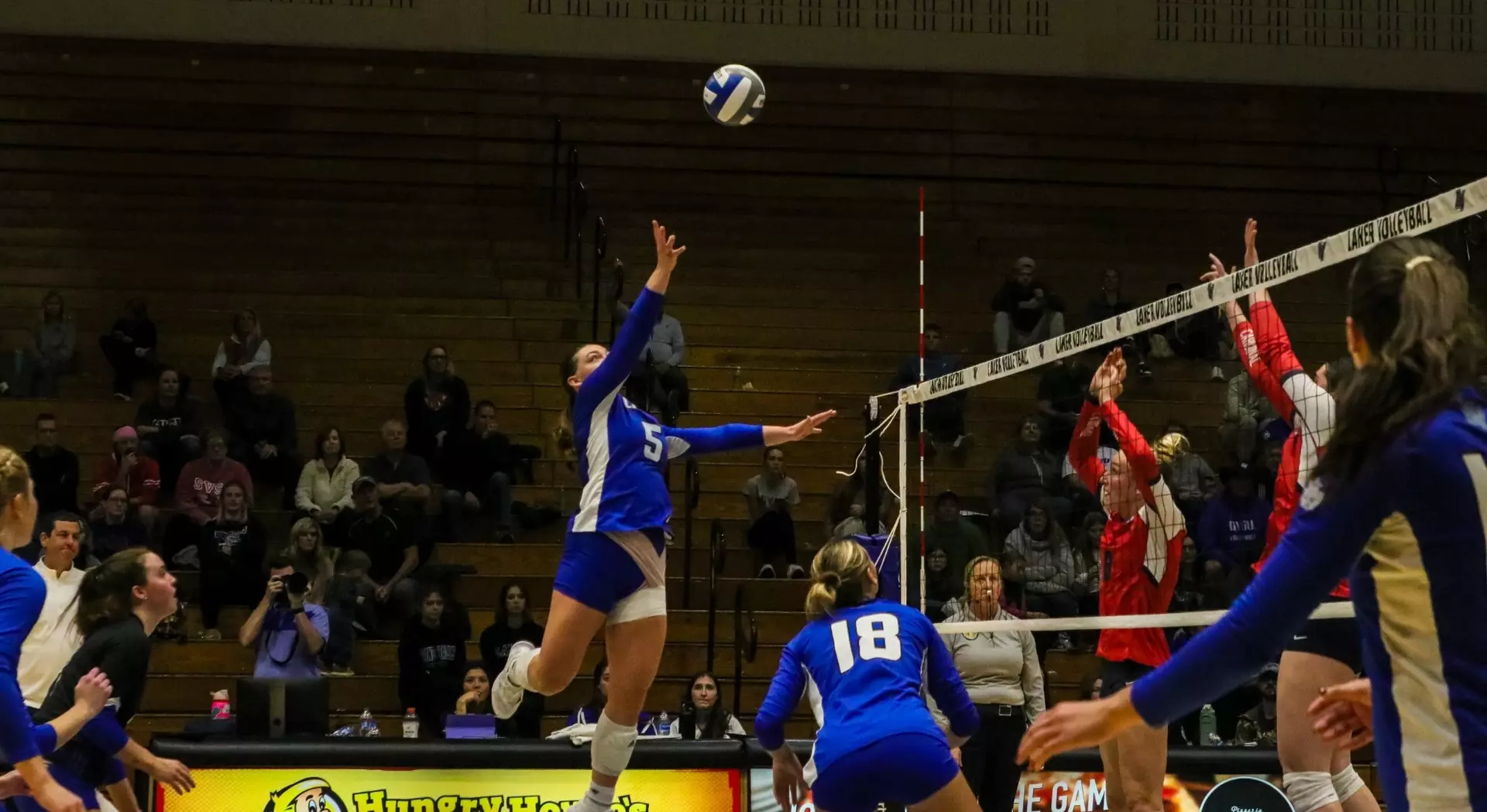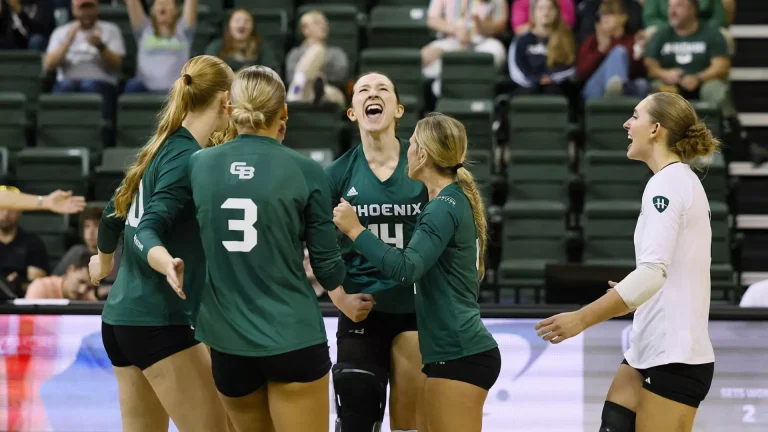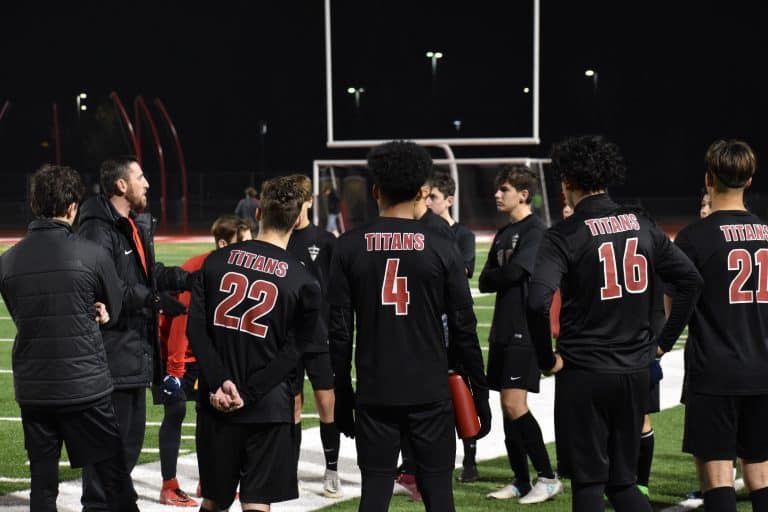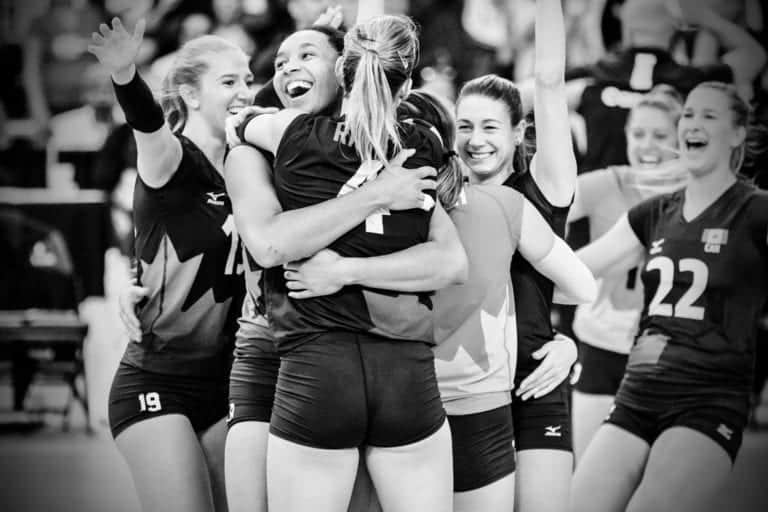Coming off the tails of their best season yet, the Grand Valley State University (GVSU) Women’s Volleyball team had a remarkable 2024 season. Finishing the season with a win record of 28-4, seeing the team achieve the most wins in a season since 2013.
The recent season’s success was a continuation of their achievements and strength in 2023, when the team finished with a 27-5 record and won the Great Lakes Intercollegiate Athletic Conference (GLIAC) regular season championship.
However, the team’s success in 2023 and 2024 wasn’t just the result of a standout season; it was part of their long-term development plan under Head Coach Jason Johnson, who took the helm in 2021 after serving as Associate Head Coach since 2005. The Lakers’ achievements reflect a narrative of continuous improvement, with a strong foundation of stability and performance built over time. When we caught up with Coach Johnson, we were eager to learn more about the development work that has propelled the team to its success.
A Steady Climb to Success
To put the Lakers’ progress into perspective:
- In Coach Johnson’s first season as head coach, the team posted a 17-10 record and earned a spot in the NCAA regional tournament for the first time since 2015. They finished 10-4 in the GLIAC and secured the fourth seed in the conference.
- The following year, 2022, the Lakers improved again, finishing 19-13.
- By 2023, the Lakers had an outstanding 27-5 season, won the GLIAC, and made it to the NCAA Regional Tournament, advancing to the second round as the fifth seed.
Since taking on the role of Head Coach, Coach Johnson has consistently improved the Lakers’ winning record each year.
Coaching for Development and Growth
Reflecting on the 2023 season, Coach Johnson said, “The 2023 season was very surreal. Things just broke our way, we played very well, and we had some good breaks. We also had some difficult times the team had to work and navigate through. I think some of those difficult moments still sit there in what’s next for us.”
He added,
“I think it’s been a multi-year commitment to what we’ve been doing. I think ever since taking over the program, there was a conversation around values, standards, and expectations, and I think that was the start of it”.
Though Coach Johnson became Head Coach in 2021, he’s been part of the program since 2003, serving as an Assistant Coach until 2005 when he was named Associate Head Coach. During his time with GVSU, he’s helped the team maintain a winning record in 19 of the 21 seasons he’s been involved.
In the lead-up to the 2023 season, Coach Johnson engaged Athlete Assessments to work with the team of some key development areas, committing to their goal of continuous improvement. Coach Johnson highlighted the impact this had on the resulting season sharing,
“The work we did with Athlete Assessments back in the pre-season really started to solidify the communication piece, the understanding of each other’s behaviors. I think that understanding was a big part of the success we had, and it’s part of what we’re talking about currently, ‘How do we take this next step?’”
He continued,
“That understanding of their own and each other’s behavior is such a big part of our athletes’ self-development. Getting to know themselves, getting to know each other, how to best communicate, but also how to best manage one another when we’re in those adverse situations has been pivotal for us.”
In the 2023 pre-season, each athlete completed their own AthleteDISC Profile, which Coach Johnson’s coaching staff completed their own CoachDISC Profile. Athlete Assessments’ DISC Profile reports highlight each individual’s strengths, limitations, and the environments in which they excel, relating to their specific role/context as an athlete or coach. The reports also delve into behavioral preferences, such as communication style, pace, and approach to building relationships. While the reports often reinforce what people already know about themselves, they provide clear and consistent language for concepts that can be difficult to articulate. Additionally, the reports reveal potential blind spots, offering insights into limitations that may not be immediately apparent. By using Athlete Assessments’ DISC, coaches can understand how to best coach their athletes, work with each other, and leverage the profiles to enhance self-awareness and team dynamics.
Coach Johnson shared, “Growth of self in our athletes has been the best part of working with [Athlete Assessments]. The DISC process creates discussion moments, it creates opportunities for us as a staff to realize that ‘Oh, we need to ask this question, or we need to engage differently here.’”
The coaching team held individual conversations with athletes about how well they engaged with their teammates. Coach Johnson and his staff questioned whether the athletes knew their teammates well enough, as effective engagement requires both self-awareness and an understanding of the other person’s communication style.
One key exercise involved placing each athlete’s DISC Profile on a four-quadrant model, a visual representation of behavioral styles. The athletes discussed what motivates them, as well as what frustrates them or puts them in difficult situations. Coach Johnson noted that this was a struggle for many, so he encouraged the athletes to post this information on the front of their lockers to help others understand and work through these challenges.
Coach Johnson explained,
“The hardest part has always been not putting our players, or anybody for that matter, in a box around their profile. I ask the athletes to also understand that profiles are based on the things you do. They need to be aware that these are the behaviors that come out. We talk about how it’s not who you are, it’s how you respond. And if you’re uncomfortable in those responses, how do we adapt them?”
Coach Johnson acknowledged that the team’s youthfulness contributed to some of the challenges they faced. “It’s not just an immaturity due to age. That’s part of it, but part of it is the immaturity of navigating difficult moments. Encountering adversity and communicating through it, and knowing yourself in those moments and how to manage them.”
He referenced the team’s final match of the 2023 season, which they lost.
“We had a great season and lost to a team that was in a better position than we were at that point. But I felt there were moments when we weren’t competing at the level I knew we were capable of. We couldn’t move past the frustration and anxiety of thinking, ‘They’re really good, and we don’t have answers.’ Instead of just focusing on showing up and giving our best, regardless of whether it was good enough. Those moments stood out to me, and I keep asking myself, ‘How do we improve in situations like that?’”
He added, “We talked a lot about our team being very averse to conflict. They’re really good on the surface, but they’re not great when the depths are setting in, and so again, that’s another growth piece for us. We talked a lot about embracing the pressure, that it’s a privilege to have it because it means the things you’re playing for matter.”
Evolving Teams and Leadership
Every academic year brings change, with seniors graduating and new freshmen joining the team. This cycle impacts team rosters, and the Lakers, like every college team, must adapt to the loss of experienced players.
In past seasons, the Lakers’ leadership council has been led by two seniors. Coach Johnson acknowledged that the departure of these seniors would leave a void but saw this as an opportunity for new athletes to step into leadership roles.
Coach Johnson developed a new leadership structure to address this gap, including two seniors and one junior. This system ensures continuity, as the junior will stay on the council after the seniors graduate, bringing valuable experience to the next leadership group.
In 2024, Athlete Assessments continued to support the team’s initiatives, though much of their development is coach- and leader-led. The Lakers’ coaching staff and leadership group’s buy-in is a testament to the impact this has on a team’s culture and continued growth. Coach Johnson added, “I don’t think culture is just a stagnant thing I think it’s an ever-evolving piece depending on who’s within your program.”
Beyond the Court
While the Lakers’ success on the court is exciting, Coach Johnson emphasized the importance of self-awareness, communication, and managing oneself and others in difficult times—skills that serve athletes well beyond their volleyball careers.
Coaches looking to emulate Coach Johnson’s success will note his focus on identifying growth opportunities within his athletes and continually working to improve both their personal and competitive skills.
Reflecting at the end of each season, Coach Johnson questions ‘How much more can we grow as a group of people over the next seven months before we get back into season next August?’
WHERE TO FROM HERE?
If this article has inspired you to explore new ways to develop your athletes or improve your team’s dynamics, now is the time to take action. Whether you’re a coach, educator, or any leadership role, consider how tools like DISC can enhance communication, self-awareness, and overall performance. Reach out to learn how these insights can be tailored to your team’s unique needs and goals.
Recommended Articles
Head Coach, Abbey Sutherland, and Mental Performance Consultant and Sport Psychologist, Cody Newton, on the importance of collaborative relationships and role modelling a foundation of trust for your team’s development.
In previous articles, we have discussed at length why a productive team culture is vital for sports teams to be successful. But how do you actually know what kind of culture exists in your sports team and whether it is productive or effective, or if it needs development? In this article we discuss the four DISC Culture Styles which are mapped to the four elements of the Competing Values Framework.
Getting the culture right in your team and organization is crucial for success on any level. So how do you ensure that your culture gives your athletes the opportunity to achieve their fullest potential? In this 7-part video presentation, Bo Hanson discusses the importance of team culture, and how effectively utilizing the GRIP Model during your season can go a long way to ensuring your team’s culture starts on, and stays on, the right track.









